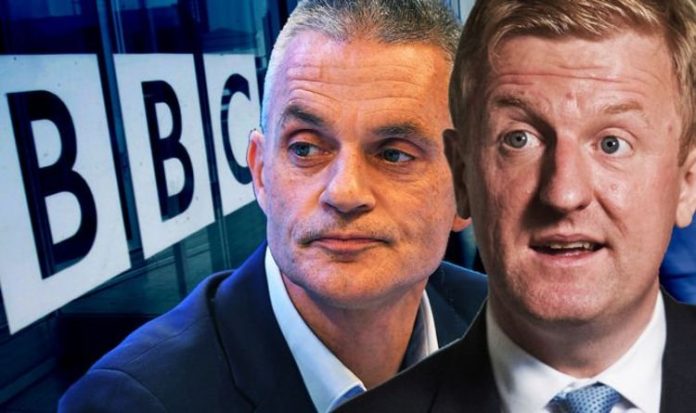Culture and Media Secretary Oliver Dowden is set to kick off the negotiations about funding for the broadcaster for at least five years from April 2022. He is also urging the corporation to slash costs and provide more “support” for the elderly following the decision to scrap free TV licences for all pensioners aged over 75. His discussions follow calls from some Tory backbenchers for non-payment of the annual fee to be decriminalised.
Mr Dowden said last night: “Public service broadcasting is woven into the cultural fabric of the UK, but to remain relevant and meet people’s needs in the digital age it must evolve.
“We are today taking a step forward in our roadmap for reform of the BBC and beginning negotiations to agree the cost of a TV licence from 2022 so that it offers fee payers the best value for money.
“We are also bringing together experts from the media and tech industries to help shape the future of the public broadcasting system and explore the reforms needed to make sure it is modern, sustainable and successful.”
The wrangle between the Government and the BBC is expected to continue until autumn next year.
In a letter to the corporation’s bosses ahead of the talks, the Cabinet minister urged the BBC to “maximise commercial revenues and continue to deliver savings.”
He asked the BBC to set pit details of any further plans to support people in vulnerable groups, including the elderly.
John O’Connell, chief executive of the TaxPayers’ Alliance, said: “These talks must deliver a fairer deal for taxpayers.
“Auntie must be ordered to keep costs down to protect households from yet another painful rise in the licence fee.
“But to guarantee the best value for money, ministers must prepare to bring the BBC’s funding model into the 21st-century.
“In the long term, public service broadcasters can only compete and survive if we axe the TV tax and let the BBC stand on its own two feet.”
Mr Dowden also revealed last night that former BBC chairman Lord Grade will join a panel of experts to advise the Government on the future of public-service broadcasting.
The 10-strong Public Service Broadcasting Advisory Panel will also include Sir Robbie Gibb, a former senior BBC boss and Downing Street communications chief, and Facebook’s Vice President for Europe Nicola Mendelsohn.
It will provide independent expertise and advice as part of the government’s strategic review of public service broadcasting.
Issues to be discussed by the panel include the possibility of privatising Channel Four.
Lord Grade said: “Our public service broadcasting remit has served the nation well for over 80 years but the time has come to review its relevance for the digital age and maybe redefine it.”
The negotiations will determine a possible change in calculating the annual TV Licence fee, currently £157.50 and linked to annual rises in inflation, and the amount of funding for the BBC and Welsh language broadcaster S4C.
Mr Dowden has asked the BBC to set out its financial needs in line with its public purposes to inform his assessment of the appropriate level for the licence fee.
The PSB Advisory Panel will advise ministers on whether public service broadcasting remains relevant and what a modern PSB system should contribute to economic, cultural and democratic life across the UK.
It will explore if current funding and governance models are fit for purpose.
The panel will also support the government in considering the issues raised and recommendations resulting from Ofcom’s ongoing public-sector broadcasting review.
Panellists will be expected to look at the impact of technology on audience habits and expectations as well as the financial sustainability of broadcasters and the overall structure of the TV market.







